English 589 / Comparative Literature 577
Aestheticus Extremus: The Politics of Precarious Invention in North American Poetry and Poetics
for John Ashbery (1927-2017)
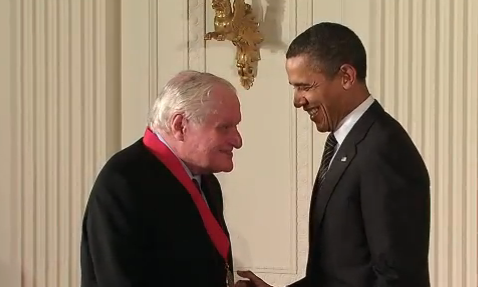
John Ashbery, Feb. 12, 2012 (receiving National Humanties Medal)

Things are in the saddle,
And ride mankind.
-- Emerson, ""Ode, Inscribed to William H. Channing" (1846)

from Tom Tit Tot, Susan Howe, in Debths
.jpg)
Frederick Church, Twilight in the Wilderness
Discussion list: please subscribe via Google Groups (info in welcome email)
Required books.
Penn Books center will have these. Support our local bookstore!
Peter Gizzi, In Defense of Nothing: Selected Poems, 1987–2011 (Wesleyan)
Best American Poetry 2016, ed. Tracie Morris & Bernstein (Wesleyan)
Tracie Morris, Handholding: Five Kinds (Kore)
PLUS: enroll in ModPo (free) (please do this now so you will be all set)
Please email immediately if you find any broken links.
0.
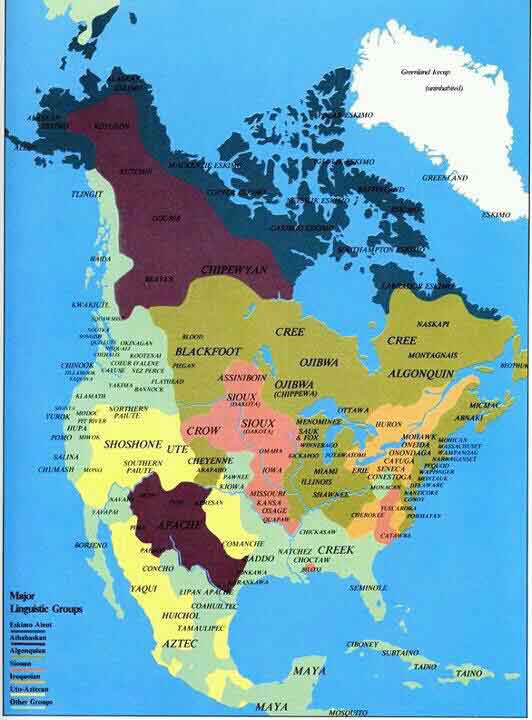
400
North American petroglyphs, c. 10,000 bce
(Nevada)

Kiowa ledger art from the 19th century at the National Museum of the American Indian in Manhattan. Below Cheyenne Ledger.

1. (Sept 11) Introduction






In class discussion: Whitman, "Respondez" (1867 version of "Poem of the Propositions of Nakedness" in the 1856 Leaves of Grass)
[Sunday, 9/17 at KHW: POETRY & MUSIC FESTIVAL 1:30 PM: Jake Marmer and Frank London 2:15 PM: Julie Patton and Paul Van Curen 3:00 PM: Bob Holman and Papa Susso]
2 (Sept. 18) "Oh, prefer? oh yes—queer word": Edgar Allan Poe (1809-1849), Nathaniel Hawthorne (1804-1864) and Herman Melville (1819-1891) + Peter Rugg: "



Poe
"The Poetic Principle" (1850)
"The System Dr. Tarr & Prof. Fether" (1845)
"The Philosophy of Literary Compostion (1850)
[respondent: Knar, Adam]
Hawthorne
in Twice Told Tales (1851)
______
"Minister’s Black Veil" (p. 44)
_______"Wakefield." (p. 142)
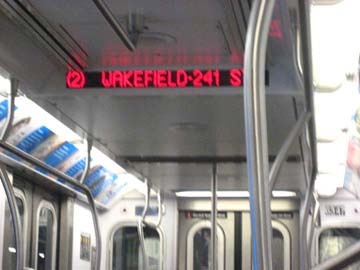
[respondent: Carlos]
Melville
Bartleby (1853)
[respondent: Alex]
William Austin
"Peter Rugg, The Missing Man" (for point of reference, skimming is recommended)
Further reading (optional):
Poe
Poe on Hawthorne
"The Bells"
"Annabel Lee": McGann recites; ms
"To Helen": McGann recites
"The Raven": McGann recites, Rathbone, Vincent Price, James Earl Jones, translations (rec: first two French (1 and 2) and first Yiddish), Christpher Walken, Lou Reed, Goringe (British)
Thomas Wentworth Higginson on Poe (1880)
Baudelaire and Mallarme tr. of "The Raven" (Robin Seguy)
Baudelaire on Poe (1857)
William Carlos Williams on Poe (1925), cf: "To One in Paradise"
D.H. Lawrence on Poe, from Classic Studies in American Literature
from Moby Dick (1851): "The Sermon": YouTube clip of Orson Welles from the John Houston move (1956) & "The Whiteness of the Whale" Richard Broadhead's The School of Hawthorne
Commentary: Why does the minister wear the veil in Hawthorne? Who is Wakefield and does it matter? Bartelby and Wakefield have often been connected, What is the connection? Bartleby is a key source for Kafka (as noted by Borges). Bartletby and Wakefield have as a possible source the strange tale of Peter Rugg, (as also noted in the preface to Susan Howe'ss Debths) –– caught in a wrinkle in time after losing his way home one night, ever after driving his "queer" carriage in a tempest, with his child at his side, saying he will arrive at Boston in the morning. Cf.: "Subject, Style, and Narrative Technique in Bartleby and Wakefield" Leo F. McNamara" Michigan Academician, 3 (1971), 41- 46 and also here.
3 (Sept. 25) Secular Sermons: Ralph Waldo Emerson (1803-1882)

NOTE: Penn only: password sent in class welcome message!
The American Scholar (1837)
The Poet (1841-43)
Self-Reliance (1841)
Experience (1844)
[respondent: Devin, Amanda]
[Thursday, 9/28 TECHNICIANS OF THE SACRED: 50TH ANNIVERSARY, KWH, 6:00 PM with Jerome Rothenberg, Ariel Resnikoff, et al]
4. (Oct. 2): Peter Gizzi class visit.
Assigned book: Peter Gizzi, In Defense of Nothing: Selected Poems, 1987–2011
[Respondent: Sam]
Plus discussion of Wallace Stevens:
"Domination in Black"
"Rabbit as King of the Ghosts"
"Large Red Man Reading": MP3 & Al Filreis & ModPo on this poem
The House Was Quiet and the World was Calm
"Not Ideas about the Thing But the Thing Itself": MP3 & PoemTalk
"Thirteen Ways of Looking at a Blackbird,"
"The Idea of Order at Key West" MP3
"The Plain Sense of Things"
Audio: at PenSound: "Large Man Reading," "Idea of Order at Key West" and "Not Ideas about the Thing Itself ... ; video with Steven's voice of "The Snow Man." See also Jim Andrews's fantasia on the Stevens's audio.
Extensions (optional)
"An Ordinary Evening in New Haven" (via LION)
Al Filreis's Stevens web page.
Academy of American Poets Stevens page
"Notes for a Supreme Fiction" (1942)
Voices & Visions TV documentary (scroll down to poet and click there) ((scroll down to poet and click there)
5. (Oct. 9) The Aesthetics of Resistance: Henry David Thoreau (1817-1862) & Frederick Douglass (1818(?)-1895) (web site)
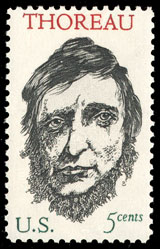 1967
1967
Thoreau:
On the Duty of Civil Disobedience [Resistance to Government] (1849)
A Plea for Captain John Brown (1859) [Penn edn, Gutenberg edn, Wik edn]: holograph from journal, detail
[respondent: Jane, Sam]
Douglass:
Lectures on American Slavery in Rochester(1850): first of the two orations
Lincoln monument oration (1876)
[respondent: Derek, Carlos]
John Brown address at Harper's Ferry (1881) (Brown's raid was in Oct. 1859. Douglass had been asked to join but declined.)
[respondent: Spencer]
Further reading:
from Walden (1854 first edn): wiki: "Economy", "Where I Live and What I Lived For", "Conclusion" (& rest of book)
Walking (1862)
Brown documents; collection of responses to Brown
Thoreau refers to this interview with Brown in his essay
Emerson on Thoreau (1862)
James Russell Lowell on Thoreau & the 1865 article
Robert Louis Stevenson's part rebuke on Thoreau (1882)
Thomas Wentworth Higginson on Thoreau (1879) & collected
Thoreau refers to this interview with Brown in his essay
Douglass My Bondage and My Freedom (1857): start with chapter 5-9, then read as much as you can of the remainder. This book is also available as a printed book in several inexpensive editions. Another digital version is here. Another here. [Archive.org is missing a few pages at end.]
West India Emancipation (1857) 'Power concedes nothing without a demand. It never did and it never will." Begin near end of speech with paragraph that starts "The general sentiment of mankind is ..." Ossie Davis reading this passage.
Jourdon Anderson, 1865 letter to his former master (as in newspaper and on 2010 blog)
Commentary question:
What is the relation of Thoreau's "Civil Disobedience" to Bartelby's metaphysical disobedience as told by Melville?
What is the relation of Thoreau's and Douglass's views of Brown?
6. (Oct 16). A Balm in Gilead: Slave Songs / Sorrow Songs / African-American Spirituals & the Aesthetics of Versions.
[Respondents: Tilly, Spencer]

"Little of beauty has America given the world save the rude grandeur God himself stamped on her bosom; the human spirit in this new world has expressed itself in vigor and ingenuity rather than in beauty. And so by fateful chance the Negro folk-song—the rhythmic cry of the slave—stands to-day not simply as the sole American music, but as the most beautiful expression of human experience born this side the seas. It has been neglected, it has been, and is, half despised, and above all it has been persistently mistaken and misunderstood; but notwithstanding, it still remains as the singular spiritual heritage of the nation and the greatest gift of the Negro people." -- W.E.B. Du Bois (1868–1963), "Sorrow Songs" in The Soul of Black Folk (1903)
Frederick Douglass on song
LOC intro to Spirituals
The Books of the American Negro Spirituals by James Weldon Johnson, J. Rosamond Johnson (with music) (1940): preface
Frederick Douglass on Juba; contermpoarry version "patting juba."
Saidiya Hartman, Scenes of Seduction (pp. 35-36):
...Yet as Douglass remarked, these seemingly meaningless and incoherent songs, though difficult for those outside and within the circle of slavery to understand revealed more about the horrors of the institution than did volumes of philosophy. While I will undertake a more extensive discussion of the politics of cultural production later. here let me stress the complexity and opacity of black song and the difficulty of clarifying, with any degree of certainty or assuredness, the politics of slave song and performance when dissolution and redress collude with one another and terror is yoked to enjoyment. This investigation, following the path laid by Douglass and W. E. B. DuBois, turns upon the veiled and half-articulate messages contained in song, Of, to quote Paul Gilroy, the politics of a lower frequency and the "unsayable claims to truth" that can never be communicated. Hence my task is neither to unearth the definitive meaning of song or dance nor to read song as an expression of black 'character as was common among nineteenth century ethnographers but to give full weight to the opacity of these texts wrought by toil, terror, and sorrow, and composed under the whip and in fleeting moments of reprieve, Rather than consider black song as an index or mirror of the slave condition, this examination emphasizes the significance of opacity as precisely that which enables something in excess of the orchestrated amusements of the enslaved and which similarly troubles distinctions between joy and sorrow and toil and leisure. For this opacity, the subterranean and veiled character of slave song must be considered in relation to the dominative imposition of transparency and the degrading hypervisibility of the enslaved, and therefore, by the same token, such concealment should be considered a form of resistance. Furthermore, as Glissant advises, "the attempt to approach a reality so hidden from view cannot be organized in terms of a series of clarifications.' '62 The right to obscurity must be respected, for the "accumulated hurt," the" rasping whispers deep in the throat, " the wild notes, and the screams lodged deep within confound simple expression and, likewise, withstand the prevailing ascriptions of black enjoyment.
Saidiya Hartman on Juba -- chapter 2 of Scenes of Seduction: p. 221 (note): Although Douglass emphasizes the critique of slavery embodied in the juba song, as he had stressed the tone of protest in the spirituals, and evaluated the song as "not a bad summary of the palpable injustice and fraud of slaver," he remained uncomfortable with the pleasures afforded the enslaved, for he was convinced that the pleasures enjoyed within the limits of slavery were simply means of "keeping down the spirit of insurrection." Douglass was unable to envision the pleasures afforded by dances, time off, and slave holidays as little more than "part and parcel of the gross wrongs and inhumanity of slavery" designed to better "secure the ends of injustice and oppression." Douglass, Life and Times, 146-147.
Here are a few of the best known of the perhaps 6000 songs/poems of African-American slaves that have been recorded and which constitute a significant portion of the poetry of the 19th century in America:
•"Swing, Low, Sweet Chariot" (wiki): Jubilee Singers, Tuskegee, & sheet music (1881); Marion Willams gospel version, Roland Hayes (1955), Paul Robeson, Eric Clapton. Extensions: the strange afterlife of this song in UK rugby: NY Times (3/7/17). See also "Swing Down Sweet Charriot" Dr. Dre, "Let Me Ride" (cf: Golden Gate Quartet, Presley, Parliament's "Mother Ship Connection"
•"Oh, Mary": Jubilee Singers: wiki, lyircs, Lomax, Leadbelly, Swan Silvertones, Mississippi John Hurt, Arthea Franklin, Bruce Spingsteen
•"Nobody Knows the Trouble I See": wiki, Jubillee, Anderson, Robeson, Sam Cook
•"Deep River": Jubilee, Tuskegee: wiki; sheet music, Jessie Norman, Anderson, Robeson, Mahalia Jackson, James Cleveland, Johnny Mathis, Bobbie Womack, Odetta, instrumental: Archie Shepp
•"Go, Down, Moses" Tuskegee (1914):wiki, Big Mama Thornton, Robeson, Anderson, Armstrong
•"There Is a Balm in Gilead": Jubilee, Wiki, see #64 here (1853), Robeson
•"Sometimes I Feel Like a Motherless Child": Clifford Reed / Lomax, Anderson, Mahalia Jackson, Robeson, Richie Havens at Woodstock, Odetta. Little Jimmy Scott, Jeanne Lee
•"We Art Climbing Jacob's Ladder": Robeson, Bernice Johnson Regan, Peter Seeger, Bruce Springsteen
•"Lay dis Body Down" (1960, SC): text (and quoted by Higginson and Johnson), Marion Williams gospel trancreation. Compare: Johnny Cash, "Ain't No Grave"
•"Michael, Row the Boat Ashore" Gospel version by Marion Williams
•"Where You There": text., Hayes, WIlliams
*"Every Time I Feel the Sprit": Hayes, Mahalia Jackson, Nat King Cole, Little Richard
•Oh, Freedom: Sankofa, Bernie Sanders; 1931 version; Odetta
•"De Gospel Train" (Get on Board, Little Children): Williams, [TRIGGER WARNING} Shirley Temple, from Dimples [Uncle Tom's Cabin sequence] (1936), Robeson
•Steal Away (wiki): Fisk Jubilee Singers, 1902 (Dinwiddie Quartet), Tuskegee, Jackson with Nat King Cole (TV 1957), Robeson, Sam Cook (pop hit), Harry Belafonte, Mavis Staples, Wilson Pickett, National Taiwan U
•"Oh , Wasn't Dat a Wide Ribber" (text in JW Johnson intro below): Fisk Jubille (starts 1:35), Anderson
•"Never Said a Mumblin Word": +++ (text also in Johnson, who has one additional line in the chorus: "Not a word-not a word-not a word"): 1938 Parchman Farm / State Penn (Lomax; no audio): audio, Anderson, Leadbelly, Golden Gate Quartet
•
Darien, GA songs
Bessie Jones / Sea Islands GA: "Daniel in the Lion's Den" recorded by Alan Lomax in 1960, "Sheep, Sheep" & Jones's commentary on song
[respondent: Jane]
Further reading / listening:
T.W. Higginson’s on spirituals (1867). Higginson was crucial to Dickinson as correspodent, supporter, and subsequent editor. He was a militant abolitonist and helped finance John Brown's raid on Harper's Ferry.
Old Plantaton Hyms (1899)
Resources (trigger warning! framed by 19th c racist attitudes):
Slave songs (1867) -- contains lyrics & sheet music; same book on Archive.org
Lauri Ramey, Slave Songs and the Birth of African American Poetry
For context for working on these materials, Hortense Spillers on African-American sermons>
Early recordings of Fisk Jubillee Singers at Spotify.
Discussion
Make transcriptions.
JW Johson mentions the difficulty of Western/classical singers performing sprituals (lacking "soul") -- and issue that comes up later in terms of the right to sing the blues, to quote the title of the Harold Arlen and Ted Koehler song. Johnson does commend two singes: Robeson and Roland Hayes. Hayes, "Go Down Moses" (1922) and Robeson doing the same song, much later. Robeson put the songs into an international repetoire (with folks songs from many countries as well as "classical" music songs, that contextualizes the sung poems of enslaved African-Americans as "art songs," while they are otherwise sung in religious, folk, soul, pop, and jazz contexts.
Were you familiar with any of these works? The works are created through analphabetic (oral) culture rather than a writing culture. Does this connect them more with other 19th century American writing or with the writings of people in cultures without writing, such as indigenous people in the Americas, or African people, or the early Greeks of the time the Homeric epics were being composed on the tongue? One characteristic of poetry in analphabetic cultures is the use of parallelism, repetition of whose phrases or lines rather than end or rhyming words. discuss this feature. What is the connection of these songs/lyrics to poetry? What is the connection of this work to the vernacular or spoken language (as opposed to literary diction and style)? The songs and chants are not necessarily accompanied by music, the tunes and rhythm arises from the words rather than being set to a tune. Unlike everything else on the syllabus, these works are anonymous and collectively created. Discuss. Comment on the Douglass's account of the songs. Compare these songs to the songs on the syllabus last week. What is their connection to 20th century American music? The lyrics of these works may also be recognized as (oral) poems (of a people without access to writing) and so considering they consitute the largest body of pre-20th century American lyrics: what happens when we think of the lyrics of these works as poems as well as songs? JW Johnson says the songs have dignity and nobility: discuss this way of presenting the songs. In what sense to they seem religious or spiritual, in what sense political or protest, in what sense folk music, in what sense lamentation or elegy? Discuss the choral elements: do the sorrow songs speak from an individual lyric voice or a group voice? Who is the "I" in the songs? How about the work songs -- how do they work in terms of call and response,dialogue, individual and group. Discuss the beat and rhythm in these works. How do the Spirituals change/adapt their Biblical sources? T Loaded question!: In the second half of the 19th century, there was a debate about whether the songs were American literature or something distinct and apart from that: comment.
[Tuesday, 10/17 HERMAN BEAVERS AND WILLIAM J. HARRIS, KHW, 6:00PM]
7. (Oct. 23) Emily Dickinson and Textual Scholarship(1830-1886)
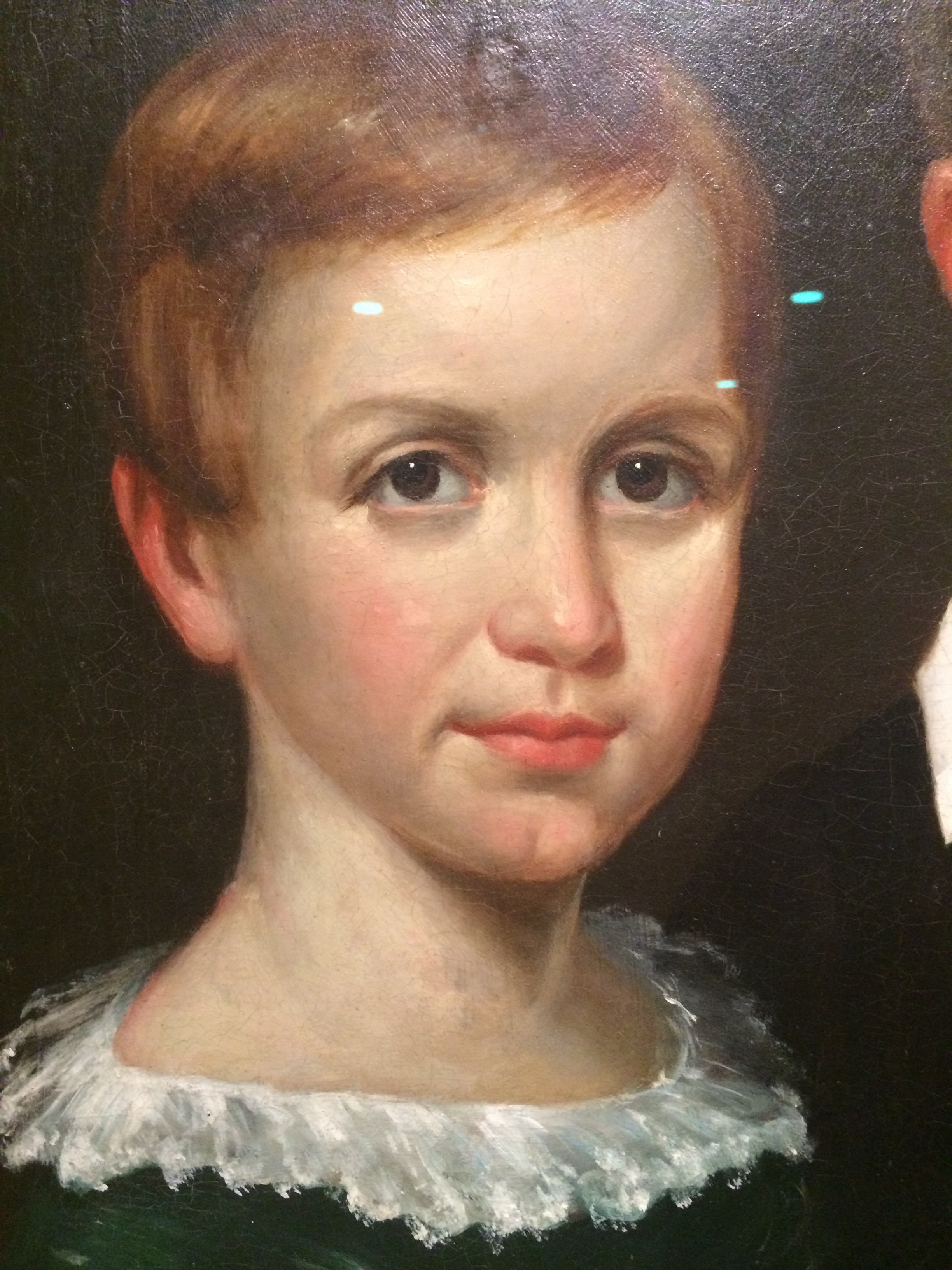
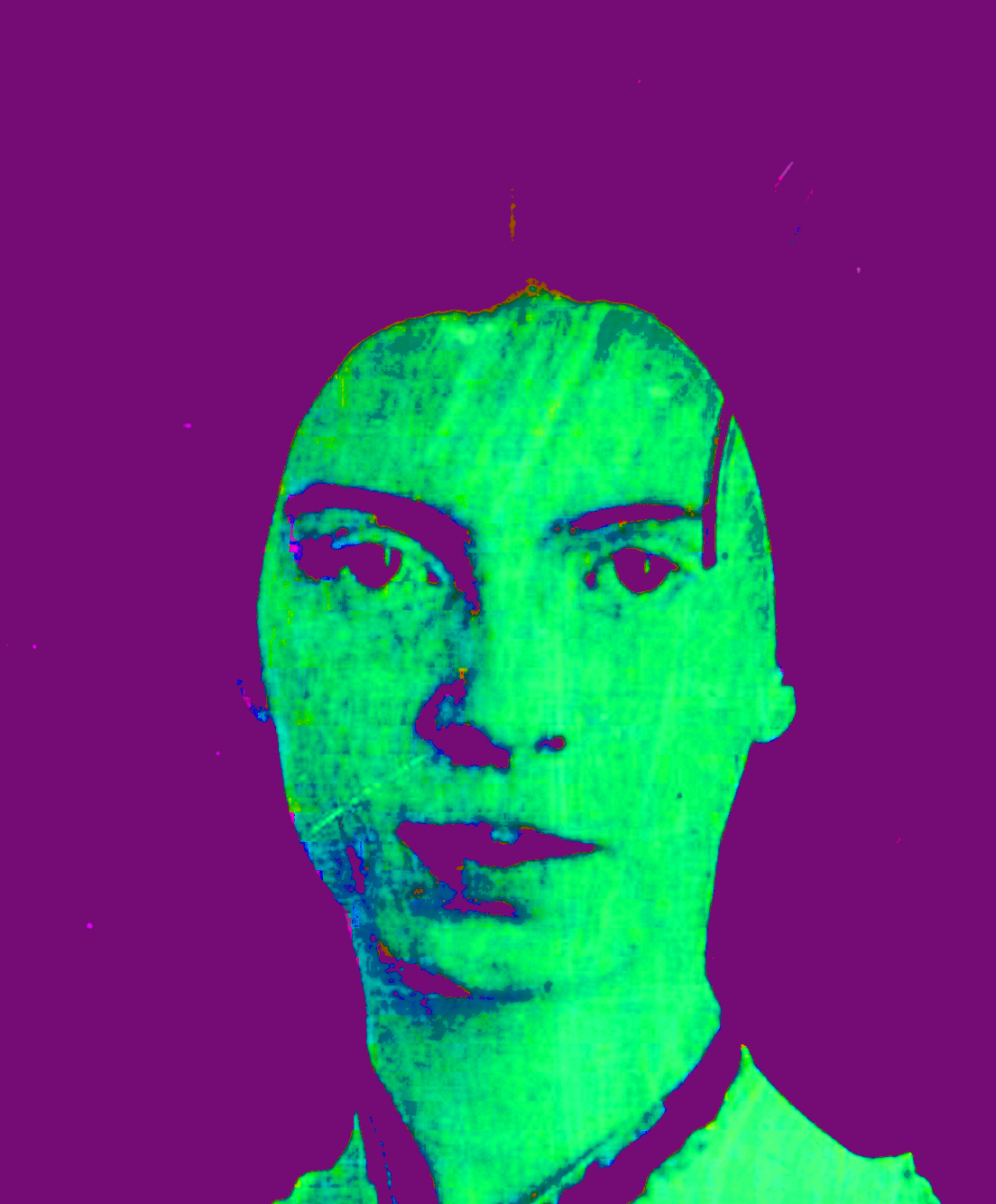
Otis Allen Bullard-1840
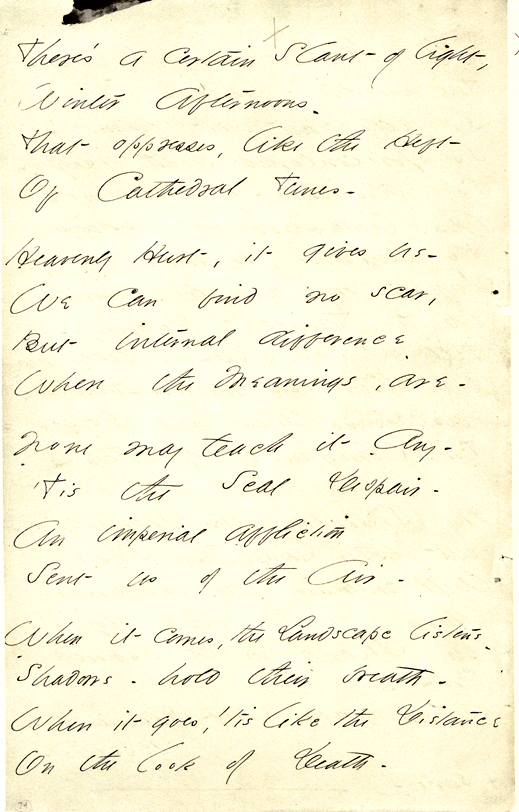
[resoindent: Tilly, Adam, David]
Dickinson Transcriptions:
"I would not paint a picture" (1866-67): Johnson version with variants
[respondent: Alex]
"World Is not Conclusion" (1866-67)
"A Certain Slant of Light" (1866-67): cp first published version
"Sacred Closet" (c. 1873)
"Sea Said" (c. 1872)
"By homely gift" [bottom of page] (c. 1883); fan site; holograph
[repondent: Jane]
"I cannot not Live with You" (1862) & 1924 edn, holograph
"I'm Nobody" (1861) [bottom of page] & 1890 edn , holograph
Susan Howe, "These Flames and Generosities of the Heart: Emily Dickinsonem and the The Illogic of Sumptuary Values" from The Birth-Mark
Marta Werner's "Radical "Scatters"; Dickinson fragments web site
Jen Bervin, Marta Werner, The Gorgeous Nothings: Emily Dickinson's Envelope-Poems: extracts & see images here
Amherst College collection (digital versions of all their holographs, including the envelope poems)
Harvard open access ED Archive
Further reading (optional):
Howe's My Emily Dickinson: excerpt
Walter Benn Michaels, introduction to The Shape of the Signifier ("The Blank Page" intro – sections on Howe's "Sumptuary Values")
Marta Werner's "Radical "Scatters"; Dickinson fragments web site
Marta Werner's Lord letters site.
Susan Howe, My Emily Dickinson; listen to an early version, with discussion, on PennSound
Howe & Werner on PBS News Hour on March 8, 2017
Al Filreis and ModPo go to the Morgan show: video
Further ED reading:
PF: Visions and Versions
2016 new edition of poems (Cristanne Miller)
T.W. Higginson on meeting ED; see Higginson on spirituals, above, and on Crane, below.
Higginson on ED's letters to him (1891)
Fascicle 16
Guttenberg Project edition (Todd/Higginson first publication in three series) (series one, Boston: Roberts Brothers, 1890), series two, 1901, at Google Books)Little Brown 1924 edn; Barteby's Bianchi 1924 edn
Johnson 1954 edn via Archive.org
Complete Poems (Johnson) in one html file (without varients) (restricted acces) (very large file)
Wiki version of complete poems
1889 review of poems in The Nation.
Deformance:
Sea and Spar Between by Nick Montfort and Stephanie Strickland
Jean Osman, reading as X, from An Essay in Asteriks: pdf
ED Random Epigram generator (refresh to get new eprigram)
[Oct. 23: James Sherry at KWH at 6pm]
8. (Oct. 30):Writing Wronging Speech
Work shouts (recored by Alan Lomax):
[respondent: Gnar, Carlos]
Take Dis Hammer
Water Boy (see JW Johnson's discussion); pdf of sheet music; Robeson (1935); Odetta; birht of blues: John Lee Hooker (Spotify); lyrics
Hammer song
Cornfield song
Cotton picking song,
Pick a Bail of Cotten
Cotton Needs Plowin' So Bad|
Extension: Sam Cook, "Chain Gang" and Tracie Morris, "Chain Gang"
Lomax prison recordings
Darien, GA songs
Bessie Jones / Sea Islands GA: "Daniel in the Lion's Den" recorded by Alan Lomax in 1960, "Sheep, Sheep" & Jones's commentary on song
Early recordings of Fisk Jubillee Singers at Spotify.
this is a reprise from Oct. 15 reading; see Jane's commentary
Paul Laurence Dunbar (1872–1906)
"When de Co'n Pone's Hot" and " We Wear The Mask"; optional: " When Malindy Sings", "At Candle-Lightin' Time," and "An Ante-Bellum Sermon". See also: MAPS page bio and critical responses to Dunbar and Complete Poems, tthe Poetry Foundation page, and Poems of Cabin and Field (1896 edn), Candle-ligthin' Time (1901) & Li'l' Gal(1904), & Joggin' Erlong(1906) with ethnographic photos. PLUS: Dunbar Digital Collection. Also: Complete Poems via Guttenberg and Google, with William Dean Howells intro, Library of Congress web guide. 1914 tribute to Dunbar. Also Herbert Marshall reads "When Malindy Sings" and "An Ante-Bellum Sermon"
Ma Rainey (1886-1939)
See Rider Blues" (1925): audio: youtube (Penn only MP3); Rainey is accompanied by Louis Armstrong and Fletcher Henderson. Web version of lyric. List of Multiple versions of the song " (not playbable) but see Groovesharkand . These no longer function well due to RA issue, but try Spotify or a few more on Grooveshark. Real Audio from Red Hot Jazz'd excellent Rainey site.
Charley Patton (c. 1891-1931)
"High Water Everywhere" and audio of Patton's performance. (I write about this work in ""The Poetics of the Americas."
Claude McKay & PF (1899-1948)
[respondent: Derek]
Songs of Jamaica (1912): "Quashie to Buccra" & "Cudjoe Fresh from De Lecture"; I also discuss these poems in "The Poetics of the Americas". See also: Constab Ballads (also from 1912).
See aslo:
"If We Must Die" (1919) MP3; McKay talks about "If We Must Die" ; Poem Talk on this sonnett.
Elizabeth Cotten (1893-1987)
"Freight Train": youtube, text
[respondent: Tilly]
Sterling Brown (1901-1989):
"Ma Rainey" & audio (texts also in web library: "Old Lem" & audio; "Old King Cotten" & audio
Geeshie Wiley (c.1908 - c. mid-1950s)
"Last Kind Words"
Woody Guthrie (1912-1967)
"Mean Talking Blues" (youtube), "1913 Massacre" (youtube)
•
Further reading/listeintening:
John Henry (originally from 1870s, Henry being a former slave)
LOC intro
"John Henry" (1947) W.D. Stewart, Benny Richardson, prisoners, via Alan Lomax (and YouTube)
Bell / Lomax (1939)
Pitman (1938)
Hazlehurst (1939)
Bessie Jones (c. 1960 / Lomax)
the legend
text
•
James Weldon Johnson (1871-1938): "The Creation," pp. 17ff (from God's Trombones, 1927).Read/listen at Johnson PennSound page. Extemions on the Johnson reading: (optional): James Weldon Johnson's intro to The Book of American Negro Poetry (1922). See in this anthology Johnson's poem "Sence You Went Away" [from Bartleby.Com's digitial version of Johnson, ed., The Book of American Negro Poetry,which also see table of contents). Note: "The Creation" is also in the Johnson anthology, but the version listed above is preferable.
9. (Nov. 6): Second Wavers
Charles Reznikoff (1894-1976) [I have several pieces on Reznikoff on the EPC page]
[respondent: Knar]
"Amelia": a case study:
the text and my commentary
Reznikoff reading the poem MP3
source material
Extenstions (optional):
SF State Reading: MP3 at PennSound
A selection of poems (in Word); for class discusion, there is also
A shorter selection, which are the ones we will discuss, time permitting
EPC selections
Collected Poems at LION and Testimony vol 1 at LION & Testimony vol 2 at LION
Zukofsky on Reznkikoff (1931): "Sincerity and Objectification"
"Reznikoff's Nearness" in My Way: Speeches and Poems; original talk (audio)
Melvin Tolson (& poetry foundation page) (1898-1966)
"Mu" from Harlem Gallery
[respondent: David]
Laura Riding (Poetry Foundation) (1901-1991) / DLB intro
[respondent: Amanda]
on renouncing poetry (Penn only)
"By a Crude Rotation" & optional futher reading: bio and prose glosses: pdf Penn only
or go to E-resources and go to Granger's and then poem title
Further Riding (Jackson) reading (optional)
:
Riding audio
I have an essay on Riding (Jackson) in My Way: Speeches and Poems
>Why does Riding renouce poetry?
>What does she mean by poetry as "lying" in "Poet' A Lying Word"
>What is the relation of word to world in these poems?
Further Reading:
The Telling
A Pamphlet Against Anthologies with Robert Graves
Anarchism Is Not Enough
Langston Hughes (1902-1997)
"The Weary Blues" (audio); text
Montage of a Dream Deferred (or via 20th C Poetry)
[respondent: Devin]
Further Hughes reading (optional)
"The Negro Speaks of Rivers" (1920: audio): text
"Dance Africaine," (audio) text
Waring Cuney (1906-1976)
"No Images" (Opportunity prize, 1926)
Louis Zukofsky (1904-1978) (links to my intro) / DLB (Scroggins) intro / PF
"A Foin Lass Bodders Me"
"Poem Beginning 'The' "(1927)
Optional/extensions:
LZ at PennSound
"A"-11; "I's (pronounced eyes), "Anew" 10, 20, 21
"Songs of Degrees" (web library only) & audio:
Songs of Degrees: 2 and 3 (2:48): MP3
With a Valentine, the 12th of February (from "Songs of Degrees") (0:15): MP3
Songs of Degrees 1 & 2 and Barely and widely (2:13): MP3
With a Valentine, the 14th of February (from "Songs of Degrees") (0:37): MP3
"Julia's Wild" (from Bottom: On Shakespeare, 1960)
Catullus & audio of 70
A"-9 (PF)
Al Filries leads a discssion of Anew #12 ("It's hard to see but think of a sea") on Poem Talk) (Text: Penn only)
Lorine Niedecker (1903-1970)
"I
Married"
"My
Life by Water" (in EPC selection)
[respondent: Adam, Peter M]
extensions/optional
EPC
selection and links
DLB intro
PF page, Poets.org
LN@Poetry Foundation
1970 reading: mp3
Charles Olson (1910-1970):
"Projective Verse" (1950) (Poetry Foundation annoted version); my "Introjective Verse" (pp. 110-112)
[Wednesday, 11/8 ERICA BAUM IN CONVERSATION WITH AL FILREIS, KWH, 6:00 PM]
10. Nov. 13: Strange Bedfellows: William Burroughs and Amiri Baraka
"According to legend the white race results from a nuclear explosion in what is now the Gobi desert some 30,000 years ago. The civilization and techniques which made the explosion possible were wiped out. The only survivors were slaves marginal to the area who had no knowledge of its science or techniques. They became albinos as a result of radiation and scattered in different directions. Some of them went into Persia northern India Greece and Turkey. Others moved westward and settled in the caves of Europe. The descendants of the cave-dwelling albinos are the present inhabitants of America and western Europe. In these caves the white settlers contracted a virus passed down along their cursed generations that was to make them what they are today a hideous threat to life on the planet. This virus this ancient parasite is what Freud calls the unconscious spawned in the caves of Europe on flesh already diseased from radiation. Anyone descended from this line is basically different from those who have not had the cave experience and contracted this deadly sickness that lives in your blood and bones and nerves that lives where you used to live before your ancestors crawled into their filthy caves. When they came out of the caves they couldn't mind their own business. They had no business of their own to mind because they didn't belong to themselves any more. They belonged to the virus. They had to kill torture conquer enslave degrade as a mad dog has to bite. At Hiroshima all was lost." -- Burroughes, Exterminator, "Astronaut's Return" via Devin Daniels.
William Burroughs on cut-ups & Brion Gysin on cut-ups
[Respondent: Devin, Sam,]
Burroughs/Gysin "Minutes to Go"
William Burroughs on cut-ups & Brion Gysin on cut-ups; pdf of full Third Mind
•
optional:
more Burroughs
The Ticket That Exploded
Burroughs, The Dead Star
•
Amiri Baraka (1934 - )
[respondent: Amanda]
Gale intro
Baraka at PennSound
WJ Harris on Baraka Selected ; Claudia Rankine on Selected.
here's a brief selected from diff. periods, all from LION:
"Preface to a 20 Volume Suicide Note", "Notes for Speech""Black Dada Nihilismus" [MAP on poem] audio& DJ Spooky mix): note text of poem in in YouTube info section (fm Preface to a 20 Vol. Suicide Note, 1957)
"The Politics of Rich Painters", "Duncan Spoke of A Process", "Political Poem", "A Poem for Speculative Hipsters" (audio) (Dead Lecturer 1964)
"Black Art" [MAP on the poem], "Ka 'Ba", "Poem for Half-White College Students" (audio) from Black Arts '65/'66
"It's Nation Time" (1970)
"Today" "At the National Black Assembly" from Hard Facts (mid 1975)
Am/Trak (1979)
"Afro-American Lyric" (1979, frm Poetry for the Advanced)
"Lowcoup" (he later used "Lowku" "Blue Monk" from Funk Lore 1996
"Somebody Blew Up America" (2001) and YouTube & this
These are among Baraka's most controversial poems. As a preface to discussion, consider Hortense Spillers, "Moving on Down the Line: Variations on the African-American Sermon" in Black, White, and In Color -- as a way of approaching this material: pdf
If these links don't work, go to LION and search Baraka ... and the title
(from Black Magic: Collected Poetry 1961-1967 (1969) , The Bobbs-Merrill Company)
"Civil Rights Poem" LION
"For Tom Postell, Dead Black Poet" LION
"The Black Man is making new Gods" LION
Further reading: Baraka on Norton anthology of African-American poetry
& while we are on such difficult material, consider this poem by Paul Goodman:
11. Nov. 20: "Thar She Blows": Loy, WCW, Pound, HD, Olson, Creeley, Eigner
Further/optional on modernist American Poetry
Further/optional on postwar American poetry
continuing on Burroughs
Mina Loy (1882-1966)
"Love Songs" (1915-1917): pdf of first publication ("Songs for Joannes") in Others in 1917
William Carlos Williams (1883-1963)
To Elsie" (e.g., "The pure products of America..."); see also James Clifford on For Elsie" & the Penn symposium on "For Elsie".
"Between Walls"; Optional: PoemTalk: Al Filreis leads a discussion of "Between Walls"
audio on PennSound: "Elsie" & "Between Walls"
[respondent: Derek, Peter M]
Ezra Pound (1895-1972)
"Moeurs Contemporains" at PEPC and note Poetry Genius annotated version
[respondent: Alex]
"Cantico del Sole" at PEPC; Sources/Discussion for "Cantico."
AUDIO at PennSound: Cantico de Sole, Moers Contemporaire, The
H.D. (1886-1961) ; pf
"Oread"
"Eurydice" (1925) (on the poem)
[respondent: David]
Charles Olson (1910-1970):
The Kingfishers (6:31) (audio/partial); text (1949): "The Kingfishers" (at LION); my commentary
Robert Creeley(1926-2005):
"I Know a Man": text alignement by Chris Mustazza
"The Language": text at
my Creeley selection at the Poetry Foundation
audio from PennSound: 1963 (U of AZ); 1965 (Berkeley Poetry Conference); 1975 (S-Press); 1984 (MLA, DC); 1986 (Germany)
[respondent: Peter M]
Larry Eigner (1927-1996) (EPC page)
"Again dawn," Eigner on PennSound and comment, sections 1 and 2
Leslie Scalapino
"Bum Series"(from Way): audio
12. Nov. 27: Gertrude Stein @ Mod Po
Al Filreis will lead this session
I’ll do Gertrude Stein (and a bit of Tzara and the Baroness) that week. Students should enroll in ModPo (free) and prepare all the Stein-related materials associated with week 4 of ModPo.
1) read all texts & listen to all audio & watch all videos in the main ModPo syllabus for week 4
2) read all texts & listen to all audio & watch all videos in the “ModPoPLUS” syllabus for week 4: scroll down to week 4
3) read all texts & listen to all audio & watch all videos in the TRC (Teacher Resource Center) for week 4
4) watch all videos about Stein in the CCCR (Community Collaborative Close Readings) syllabus for week 4:
13. Dec. 4: BAX + Morris
Required books: Best American Poetry 2016, ed. Tracie Morris & Bernstein
Tracie Morris, Handholding: Five Kinds (Kore)
Sam Cook, "Chain Gang" and Tracie Morris, "Chain Gang" & Morris on PennSound.
Morris on Stein on ModPo
Dec. 5: M. NourbeSe Philip and Kyoo Lee at KWH at 6.
14. Dec. 11 (Last Class):
Each seminar member will discuss their overall responses to the class and present their current research.
background image: Frederick Church, Twilight in the Wilderness (1860)
American aesthetics: under construction
